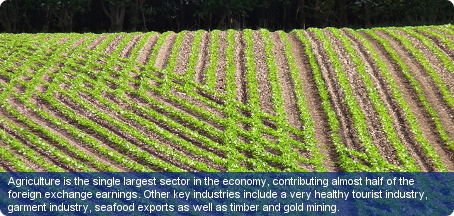Find a business in Fiji

While Fiji has a largely agricultural economy it is nonetheless one of the most developed of the Pacific island states. It has a GNI per capita of US$4,110 (2012), but has seen relatively little recent GDP growth: 0.8% per annum (2008-12). The economy is dependent upon the agricultural sector, remittances from abroad and tourism. However following a coup in December 2006, political instability has threatened the Fijian economy.
Agriculture contributes around 10% of the country’s GDP and employs almost 2,000 Fijians (2010). The Fijian agriculture sector is a mix of commercial and subsistence farming, although commercial farming predominates. This industry was once the backbone of the Fiji’s economy with sugarcane as the main crop. However, in recent years the government has made steps to decrease the economy’s reliance on this crop by supporting the production of other goods such as coconuts, bananas and cereals, with a focus towards supplying the tourism industry. As a result, non-sugarcane crops contributed around three times more than that of sugar cane in 2010.
Sugar exports, remittances from Fijians working abroad, and the tourist industry – with 400,000 to 500,000 tourists annually – are the major sources of foreign exchange. As of 2009, the country’s main export markets are the USA, Australia and the UK; imports are mainly from Singapore, Australia and New Zealand.
In 2011 travel and tourism directly contributed 13.1% of GDP providing 11.7% of total employment (World Travel and Tourism estimate). The main types of tourism available in the country are adventure, cultural, and ecotourism; these attracted around 630,000 tourists in 2010, of which almost 50% were from Australia.
Fiji’s construction industry flourished throughout the period between 2000-06, spearheaded by building projects for the tourism industry. However, in light of the political instability experienced in 2006, private sector foreign investment was subdued and the sector declined by 20% in 2007. There are signs of encouragement in the industry, as it grew by 3.5% in 2010 and $200 million of work put in place was registered in the same year. Fiji’s construction industry amounted to about 3% of GDP in 2010.
Traditionally Fiji’s sugar has had preferential access to the markets of the European Union. A decision by the EU to cut sugar subsidies means that Fiji’s sugar industry which represents a third of the islands manufacturing base, and which is not noted for its efficiency, is going to come under further pressure.
There is little doubt that the military coup in 2006 is having an adverse effect on Fiji’s tourism industry. The coup has already created a difficult business climate. The EU suspended all aid until the government took steps toward new elections. Long-term problems include low investment, uncertainty over land ownership rights, and the government’s struggle to balance its budget.
Fiji was ranked 10th for ease of doing business among East Asian and Pacific countries in the World Bank’s ‘Doing Business 2012’ study. These rankings measure the conduciveness of a regulatory regime in starting and operating a business.
Fiji has a 94% literacy rate and the vast majority of the country’s inhabitants speak English as their second language. As of 2009 Fiji’s work force was 330,000 strong with around 60% working in the agriculture either as part of the formal sector or in a subsistence capacity.



